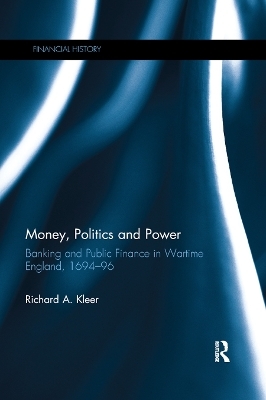
Money, Politics and Power
Routledge (Verlag)
978-0-367-88882-4 (ISBN)
The Nine Years’ War with France was a period of great institutional innovation in public finance and of severe monetary turmoil for England. It saw the creation of the Bank of England; a sudden sharp fall in the external value of the pound; a massive undertaking to melt down and recoin most of the nation’s silver currency; a failed attempt to create a National Land Bank as a competitor to the Bank of England; and the ensuing outbreak of a sharp monetary and financial crisis.
Histories of this period usually divide these events into two main topics, treated in isolation from one another: the recoinage debate and ensuing monetary crisis and a ‘battle of the banks’. The first is often interpreted as the pyrrhic victory of a creditor-dominated parliament over the nation’s debtors, one that led very predictably to the ensuing monetary crisis. The second has been construed as a contest between whig-merchant and tory-gentry visions of the proper place of banking in England’s future. This book binds the two strands into a single narrative, resulting in a very different interpretation of both. Parliamentary debate over the recoinage was superficial and misleading; beneath the surface, it was just another front for the battle of the banks. And the latter had little to do with competing philosophies of economic development; it was rather a pragmatic struggle for profit and power, involving interlocking contests between two groups of financiers and two sets of politicians within the royal administration. The monetary crisis of summer 1696 was not the result of poor planning by the Treasury; rather it was a continuation of the battle of the banks, fought on new ground but with the same ultimate intent – to establish dominance in the lucrative business of private lending to the crown.
Richard A. Kleer is an Associate Professor in the Department of Economics, and Dean of the Faculty of Arts, at the University of Regina, Canada.
1. Introduction
Part I: The institutional and economic context
2. England’s wartime system of public finance
3. The inception of the Bank of England
4. Parliamentary measures against clipping and bullion exports, 1689-95
5. The growing problem of war remittances
6. Land-bank projects, 1694-95
Part II: The political and policy narrative
7. The administrative debate on the state of the currency, September–November 1695
8. The act for remedying the ill state of the coin, November 1695–January 1696
9. Banking projects and public finance, early 1696
10. Guineas and the National Land Bank, February–April 1696
11. Connecting the dots: monetary policies as means to political ends
12. Monetary and financial crisis in England and the plight of the English army in Flanders, spring – summer 1696
13. Concluding remarks
Index
| Erscheinungsdatum | 16.12.2019 |
|---|---|
| Reihe/Serie | Financial History |
| Verlagsort | London |
| Sprache | englisch |
| Maße | 156 x 234 mm |
| Gewicht | 381 g |
| Themenwelt | Geschichte ► Teilgebiete der Geschichte ► Wirtschaftsgeschichte |
| Wirtschaft ► Betriebswirtschaft / Management ► Finanzierung | |
| Wirtschaft ► Betriebswirtschaft / Management ► Rechnungswesen / Bilanzen | |
| Betriebswirtschaft / Management ► Spezielle Betriebswirtschaftslehre ► Bankbetriebslehre | |
| Wirtschaft ► Betriebswirtschaft / Management ► Unternehmensführung / Management | |
| Wirtschaft ► Volkswirtschaftslehre ► Finanzwissenschaft | |
| ISBN-10 | 0-367-88882-3 / 0367888823 |
| ISBN-13 | 978-0-367-88882-4 / 9780367888824 |
| Zustand | Neuware |
| Haben Sie eine Frage zum Produkt? |
aus dem Bereich


